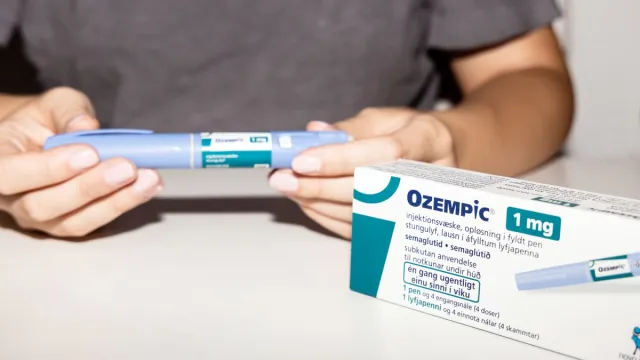7 Health Benefits of Ozempic That Aren’t About Weight Loss, According to Science

When combined with a healthy lifestyle, Ozempic can transform your physique by helping you shed excess weight. In fact, studies show that people taking the drug lose an average of 15 percent of their body weight over 15 months. However, slimming down is just one result of beginning a weekly semaglutide regimen—and hardly the only consideration. While much more research is needed to understand their long-term side effects, this new class of weight loss drugs could also have groundbreaking implications for other areas of medicine. Wondering which additional health benefits may come with taking Ozempic, besides losing weight? Read on to learn the seven conditions Ozempic could someday be used to treat.
RELATED: What Really Happens If You Stop Taking Ozempic, Doctors Say.
1
Diabetes

Ozempic is now commonly used to treat obesity, but that’s just its off-label use. Its original purpose—and its current FDA approval—is as a treatment for Type 2 diabetes.
Here’s how it works: A weekly injection of this GLP-1 analogue medication helps patients to manage their blood sugar and HbA1c. This increases the amount of incretins—peptide hormones secreted in the gut after a meal—which helps the pancreas produce insulin and lowers glucose levels.
2
Heart disease

Obesity is a leading risk factor for cardiovascular disease (CVD), and losing weight is an effective way to significantly improve your heart health. In particular, as you shed pounds, you’ll lower your risk of hypertension, stroke, heart attack, heart failure, arterial aneurysm, and more.
Though more traditional weight loss methods such as diet and exercise offer similar benefits, a recent study found that taking semaglutide-based drugs could lower one’s risk of heart attack and stroke by up to 20 percent.
3
Polycystic ovarian syndrome (PCOS)

Polycystic Ovarian Syndrome (PCOS) is a condition that occurs when the ovaries over-produce hormones called androgens. This causes the outer edges of the ovaries to develop small sacs of fluid called cysts, potentially interfering with one’s menstrual cycle and fertility.
Weight loss is often recommended for overweight individuals with PCOS as a means of reducing symptoms and improving fertility outcomes. Studies have shown that reducing one’s body weight by five to 10 percent—whether by using weight loss medication or by other means—can restore more regular ovulation and menstruation.
RELATED: Brand New Drug Reverses Obesity With No Real Side Effects, Researchers Say.
4
Inflammation

When you’re sick or injured, the body responds by sending white blood cells to protect the affected area. This is known as acute inflammation, and it’s an important feature of the immune system. However, being in a prolonged state of chronic inflammation is unhealthy for the body and has been linked to heart disease, cancer, diabetes, arthritis, and more.
By reducing your rate of chronic inflammation, you can lower your risk of these serious health conditions. Since obesity often worsens insulin resistance, which in turn worsens inflammation, losing weight and regulating your blood sugar can help you do so.
Moreover, a recent study published in Kidney International showed that semaglutide-based drugs such as Ozempic “are very powerful at reducing inflammation,” Mark Cooper, PhD, a co-author of the study and the head of the Department of Diabetes at Monash University in Australia, told Medical News Today.
5
Chronic kidney disease (CKD)

Roughly one-third of patients with Type 2 diabetes will also go on to develop chronic kidney disease (CKD) as high blood sugar damages the blood vessels in those organs. Ultimately, this prevents the kidneys from filtering blood properly, stopping them from removing waste and excess fluid from the body.
Without optimal function, patients may require dialysis or a kidney transplant to prevent a fatal outcome. By reducing one’s risk of diabetes, Ozempic can help those at risk of kidney disease from developing this life-threatening condition.
In fact, in October, Ozempic maker Novo Nordisk announced that a trial studying Ozempic in diabetic patients with chronic CKD showed “that the treatment was successful in treating kidney failure in this patient group,” according to interim results.
RELATED: Ozempic Patients Say It “Stops Working” for Weight Loss—How to Prevent That.
6
Liver disease

Being obese and having Type 2 diabetes are two of the most predictive factors in whether a person will go on to develop non-alcoholic fatty liver disease (NAFLD), a condition that occurs when fat builds up excessively in the liver. In fact, between 50 and 90 percent of people with obesity suffer from the condition, according to a 2019 study published in the International Journal of Biological Sciences. Seventy percent of people with diabetes also have NAFLD.
Currently, there is no drug approved by the FDA to treat NAFLD, but some early studies suggest that Ozempic can reduce incidence of the condition by lowering weight and reducing one’s risk of diabetes. Researchers are now investigating whether semaglutide drugs may improve liver scarring or cirrhosis, a common feature of NAFLD.
7
Alcohol use disorder

Finally, those who suffer from alcohol use disorder, commonly known as alcoholism, may find some relief from their addiction while taking Ozempic. Many people have anecdotally reported that while taking the drug, they lost their interest in alcohol and reduced their intake—or stopped drinking completely.
Experts explain that just as Ozempic reduces appetite and “food noise”—the brain’s constant chatter about food—it appears to calm cravings for alcohol and other stimulants as well. However, more research is needed before doctors can recommend Ozempic as a treatment for alcohol use disorder.
For more health news sent directly to your inbox, sign up for our daily newsletter.
Best Life offers the most up-to-date information from top experts, new research, and health agencies, but our content is not meant to be a substitute for professional guidance. When it comes to the medication you’re taking or any other health questions you have, always consult your healthcare provider directly.
- Source: FDA
- Source: Novo Nordisk, SELECT trial
- Source: Mayo Clinic, Polycystic ovary syndrome (PCOS)
- Source: Journal of Gynecology Obstetrics and Human Reproduction
- Source: Kidney International
- Source: International Journal of Biological Sciences
- Source: Nutrients, Once-Weekly Subcutaneous Semaglutide Improves Fatty Liver Disease in Patients with Type 2 Diabetes